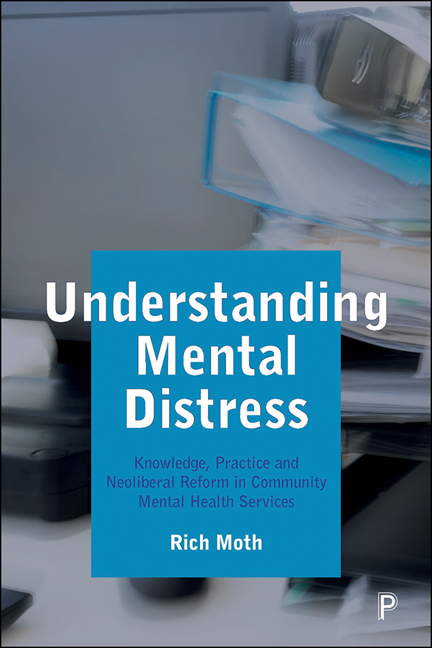 Understanding Mental Distress
Understanding Mental Distress Book contents
- Frontmatter
- Dedication
- Contents
- List of tables
- List of abbreviations
- Notes on the author
- Acknowledgements
- Introduction
- PART I Sociohistorical contexts of policy and practice
- PART II Lived experiences of neoliberal reform
- PART III Theorising knowledge and practice
- Conclusion
- Appendix: methodology
- Notes
- References
- Index
4 - Risk and responsibilisation
Published online by Cambridge University Press: 08 October 2022
- Frontmatter
- Dedication
- Contents
- List of tables
- List of abbreviations
- Notes on the author
- Acknowledgements
- Introduction
- PART I Sociohistorical contexts of policy and practice
- PART II Lived experiences of neoliberal reform
- PART III Theorising knowledge and practice
- Conclusion
- Appendix: methodology
- Notes
- References
- Index
Summary
The last chapter introduced a number of service users and practitioners. The examples described relational casework during what practitioners called a ‘stable phase’ and challenges to this associated with new informational ways of working. This and the next chapter build on and extend this exploration of the dialectic of possibility and constraint in CMHT work through a focus on interactions with service users considered to be ‘in crisis’. This chapter is about Emmanuel, or Manu as he is generally known to family members and practitioners, and his experiences at Southville CMHT and within inpatient services. It illustrates how a defensive institutional culture around risk management generates tendencies towards what is called ‘custodial paternalism’. It also examines how this marginalises considerations on the effects of racialised inequalities.
Upton Ward at the Middletown Centre Mental Health Unit
Many of the events in this chapter took place on ‘Upton’ Ward, part of the ‘Middletown Centre’ Mental Health Unit at ‘Westside Park’ Hospital. The hospital is an NHS facility providing adult and older persons’ mental health in-patient services. It is located on a site encompassing several imposing redbrick buildings, constructed as a workhouse infirmary in the late Victorian era. Upton Ward has 16 beds, eight for men and the same number for women in a separate area.
Every week there is a ward round. This is a multidisciplinary meeting on Monday mornings where Upton Ward staff meet with each individual patient, community team members and, where possible, informal carers such as family members, to explore the patient's progress and review and develop care plans. This is generally led by the consultant psychiatrist. During the fieldwork, this meeting took place in a room halfway between the nurses’ station and the lounge. Eight or nine chairs were placed in a large circle for the meeting, with any spares stacked at the side of the room. The spring on the room's heavy door meant that it slammed every time someone entered or left and, in combination with resin flooring and high Victorian ceilings, the sound echoed piercingly around the space. The faint sound of a Bollywood playback singer drifted in from one of the bedrooms. Consultant psychiatrist Dr James Bryant insisted the chair next to him be left solely for patients to use, complaining that he struggled to hear what was said otherwise.
- Type
- Chapter
- Information
- Understanding Mental DistressKnowledge, Practice and Neoliberal Reform in Community Mental Health Services, pp. 82 - 109Publisher: Bristol University PressPrint publication year: 2022


